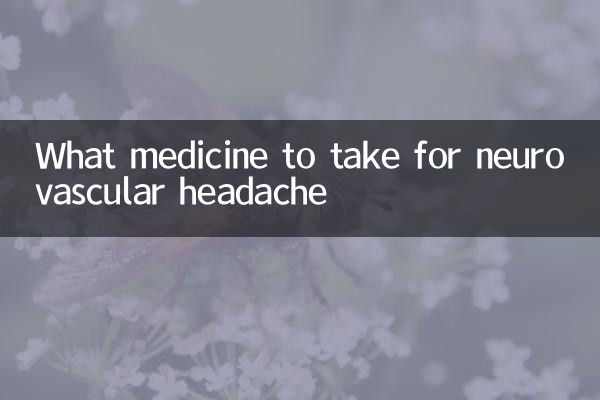What medicine to take for neurovascular headache
Neurovascular headache is a common type of headache that usually presents as throbbing pain and may be accompanied by symptoms such as nausea, vomiting, or sensitivity to light and sound. In recent years, with the accelerated pace of life and increased stress, the incidence of neurovascular headaches has gradually increased. This article will combine the hot topics and hot content on the Internet in the past 10 days to give you a detailed introduction to the drug treatment options for neurovascular headaches and provide structured data for reference.
1. Common drugs for neurovascular headaches

Drugs for the treatment of neurovascular headaches are mainly divided into two categories: acute treatment and preventive treatment. The following are common drug classifications and mechanisms of action:
| drug type | Representative medicine | Mechanism of action | Applicable people |
|---|---|---|---|
| NSAIDs | ibuprofen, aspirin | Inhibits prostaglandin synthesis, reducing inflammation and pain | Patients with mild to moderate headaches |
| Triptans | sumatriptan, zolmitriptan | Selectively activates 5-HT1B/1D receptors and constricts blood vessels | Patients with moderate to severe headaches |
| Ergotamines | ergotamine caffeine | Constrict blood vessels and inhibit neuropeptide release | Traditional treatment ineffective |
| preventive medicine | propranolol, amitriptyline | Regulates neurotransmitters to reduce seizure frequency | Patients with frequent attacks |
2. Analysis of hot topics on the entire network in the past 10 days
By monitoring major health platforms, social media and medical forums, we found the following hot discussion topics about neurovascular headaches:
| Ranking | hot topics | Discussion popularity | main focus |
|---|---|---|---|
| 1 | Triptans side effects | high | cardiovascular risk, drug resistance |
| 2 | Effects of new CGRP inhibitors | Middle to high | Efficacy, price, accessibility |
| 3 | Traditional Chinese Medicine Treats Headaches | middle | Acupuncture, Chinese medicine prescriptions |
| 4 | lifestyle adjustments | middle | Diet, sleep, stress management |
| 5 | Drug combination treatment plan | medium low | Synergy of different drugs |
3. Medication recommendations for different types of headaches
Medication regimens vary depending on the severity and frequency of headaches. The following are medication recommendations for different situations:
| Headache type | Attack frequency | Recommended medicine | Things to note |
|---|---|---|---|
| Mild attack | 1-2 times a month | NSAIDs | Avoid long-term use |
| moderate attack | 3-4 times a month | Triptans | Be aware of cardiovascular risks |
| severe attack | More than 1 time per week | Triptans + preventive drugs | Requires medical guidance |
| chronic headache | More than 15 days per month | comprehensive treatment plan | multidisciplinary consultation |
4. Medication precautions
1.personalized medicine: Different patients have very different reactions to drugs, and they need to find the drug and dosage that suits them best under the guidance of a doctor.
2.Avoid drug abuse: Excessive use of analgesics may lead to drug-dependent headaches. It is generally recommended to use acute phase drugs no more than 10 days per month.
3.Pay attention to side effects: Triptan drugs may cause chest tightness, dizziness and other discomforts. Ergotamine drugs have a vasoconstrictive effect and should be used with caution in patients with cardiovascular disease.
4.Combined non-pharmacological treatment: Non-drug methods such as biofeedback, acupuncture, and relaxation training can be used as an effective supplement to drug treatment.
5. Latest Treatment Progress
Recently, CGRP (calcitonin gene-related peptide) inhibitors have become a hot topic in the treatment of neurovascular headaches. This class of drugs prevents headache attacks by blocking the effects of CGRP. They include:
| Drug name | type | Dosing method | Advantages |
|---|---|---|---|
| Erenumab | monoclonal antibodies | subcutaneous injection | once a month |
| Fremanezumab | monoclonal antibodies | subcutaneous injection | Quarterly |
| Rimegepant | small molecule drugs | oral | Acute + preventive double effect |
Although these new drugs are effective, they are currently expensive and have limited accessibility in the country. Patients need to consider economic factors when choosing.
6. Summary and suggestions
Drug treatment of neurovascular headaches needs to follow the principle of "controlling symptoms in the acute phase and reducing attacks in the preventive phase". For patients with occasional attacks, over-the-counter analgesics can be chosen; for patients with frequent attacks, a preventive treatment plan needs to be developed under the guidance of a doctor. At the same time, maintaining a healthy lifestyle, managing stress, and having a regular schedule are also important measures to prevent headache attacks.
If the headache symptoms continue to worsen or new symptoms appear, you should seek medical treatment promptly to rule out the possibility of other serious diseases. Remember, any medicine should be used under the guidance of a professional doctor, and never adjust the medication plan on your own.

check the details

check the details